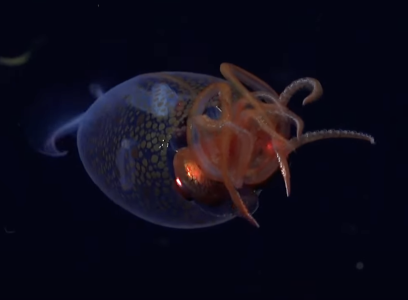What lurks 2,000 feet below? The cameras just found out!
- Replies 0
The ocean's depths are Earth's final frontier, a realm where sunlight dares not venture and where creatures of myth and legend glide through the eternal twilight.
For decades, the colossal squid has been one of the ocean's most enigmatic denizens, a creature known more through whispered sailor's tales and the scars on its predators than through human eyes.
But now, for the first time, this mysterious giant of the deep has been caught on camera, nearly 2,000 feet below the ocean's surface, offering a rare glimpse into a world beyond our own.
The groundbreaking footage was captured on March 9 by a team of intrepid scientists and crew aboard the Schmidt Ocean Institute's research vessel Falkor, near the remote South Sandwich Islands in the South Atlantic Ocean.
The juvenile colossal squid, scientifically named Mesonychoteuthis hamiltoni, measured nearly one foot long—a mere infant compared to the size it could potentially reach as an adult.
The video, a marvel of modern exploration, was recorded by the institute's remotely operated vehicle (ROV) SuBastian.
This high-tech ambassador to the deep plunged into the abyssal waters, its cameras relaying images that have captivated the scientific community and the public alike.

“It’s exciting to see the first in situ footage of a juvenile colossal and humbling to think that they have no idea that humans exist,” remarked Kat Bolstad of the Auckland University of Technology, who, along with Aaron Evans, an independent expert on the glass squid family, verified the authenticity of the video.
Their excitement is shared by all who have longed to understand more about these elusive giants.
For a century, our knowledge of the colossal squid has been pieced together from the remains found in the stomachs of sperm whales and from the occasional specimen hauled up in fishing nets.
Identified and named in 1925, the colossal squid has remained a phantom, its life cycle shrouded in mystery.
Also read: Scientists created furry mice: Are woolly mammoths roaming the Earth again?
As it matures, the squid loses its transparent body, growing up to 23 feet in length and weighing as much as 1,100 pounds, making it the heaviest invertebrate on the planet.
The colossal squid is often confused with its relative, the giant squid. However, the two are distinct species, with the colossal squid boasting a more robust body and shorter tentacles, each armed with hooks—a feature that sets it apart and hints at a life of silent predation in the cold, dark waters.
The Schmidt Ocean Institute's ROV SuBastian has been a pioneer in deep-sea exploration, capturing the first confirmed footage of at least four squid species in the wild.
This includes the enigmatic Promachoteuthis last year and the ram's horn squid in 2020, each discovery adding a new chapter to our understanding of the ocean's depths.
The significance of this footage extends beyond the thrill of discovery. It represents a beacon of hope for conservation and a reminder of the vast unknown that still lies beneath the waves.
Source: Guardian News / Youtube.
As we marvel at the sight of the colossal squid in its natural habitat, we are reminded of the importance of preserving these mysterious ecosystems for future generations.
Read next: De-extinction: Scientists claim to have brought the dire wolf back

Share your thoughts and feelings about this deep-sea discovery. Have you ever been fascinated by the creatures of the deep? Do you have a story or a personal connection to the ocean that you'd like to share? Let's continue the conversation in the comments below!
For decades, the colossal squid has been one of the ocean's most enigmatic denizens, a creature known more through whispered sailor's tales and the scars on its predators than through human eyes.
But now, for the first time, this mysterious giant of the deep has been caught on camera, nearly 2,000 feet below the ocean's surface, offering a rare glimpse into a world beyond our own.
The groundbreaking footage was captured on March 9 by a team of intrepid scientists and crew aboard the Schmidt Ocean Institute's research vessel Falkor, near the remote South Sandwich Islands in the South Atlantic Ocean.
The juvenile colossal squid, scientifically named Mesonychoteuthis hamiltoni, measured nearly one foot long—a mere infant compared to the size it could potentially reach as an adult.
The video, a marvel of modern exploration, was recorded by the institute's remotely operated vehicle (ROV) SuBastian.
This high-tech ambassador to the deep plunged into the abyssal waters, its cameras relaying images that have captivated the scientific community and the public alike.

Scientists captured the first live footage of a juvenile colossal squid, Mesonychoteuthis hamiltoni, swimming in the deep sea. Image source: IFLScience / Youtube.
“It’s exciting to see the first in situ footage of a juvenile colossal and humbling to think that they have no idea that humans exist,” remarked Kat Bolstad of the Auckland University of Technology, who, along with Aaron Evans, an independent expert on the glass squid family, verified the authenticity of the video.
Their excitement is shared by all who have longed to understand more about these elusive giants.
For a century, our knowledge of the colossal squid has been pieced together from the remains found in the stomachs of sperm whales and from the occasional specimen hauled up in fishing nets.
Identified and named in 1925, the colossal squid has remained a phantom, its life cycle shrouded in mystery.
Also read: Scientists created furry mice: Are woolly mammoths roaming the Earth again?
As it matures, the squid loses its transparent body, growing up to 23 feet in length and weighing as much as 1,100 pounds, making it the heaviest invertebrate on the planet.
The colossal squid is often confused with its relative, the giant squid. However, the two are distinct species, with the colossal squid boasting a more robust body and shorter tentacles, each armed with hooks—a feature that sets it apart and hints at a life of silent predation in the cold, dark waters.
The Schmidt Ocean Institute's ROV SuBastian has been a pioneer in deep-sea exploration, capturing the first confirmed footage of at least four squid species in the wild.
This includes the enigmatic Promachoteuthis last year and the ram's horn squid in 2020, each discovery adding a new chapter to our understanding of the ocean's depths.
The significance of this footage extends beyond the thrill of discovery. It represents a beacon of hope for conservation and a reminder of the vast unknown that still lies beneath the waves.
Source: Guardian News / Youtube.
As we marvel at the sight of the colossal squid in its natural habitat, we are reminded of the importance of preserving these mysterious ecosystems for future generations.
Read next: De-extinction: Scientists claim to have brought the dire wolf back
Key Takeaways
- Scientists captured the first live footage of a juvenile colossal squid, Mesonychoteuthis hamiltoni, swimming in the deep sea.
- The sighting occurred near the South Sandwich Islands at a depth of 1,968 feet, filmed using an ROV on the research vessel Falkor.
- The colossal squid is the heaviest invertebrate known, with potential to grow up to 23 feet in length and weigh as much as 1,100 pounds.
- The colossal squid is distinct from the giant squid, notable for its shorter tentacles with hooks, and has been elusive to researchers until now.
Share your thoughts and feelings about this deep-sea discovery. Have you ever been fascinated by the creatures of the deep? Do you have a story or a personal connection to the ocean that you'd like to share? Let's continue the conversation in the comments below!






